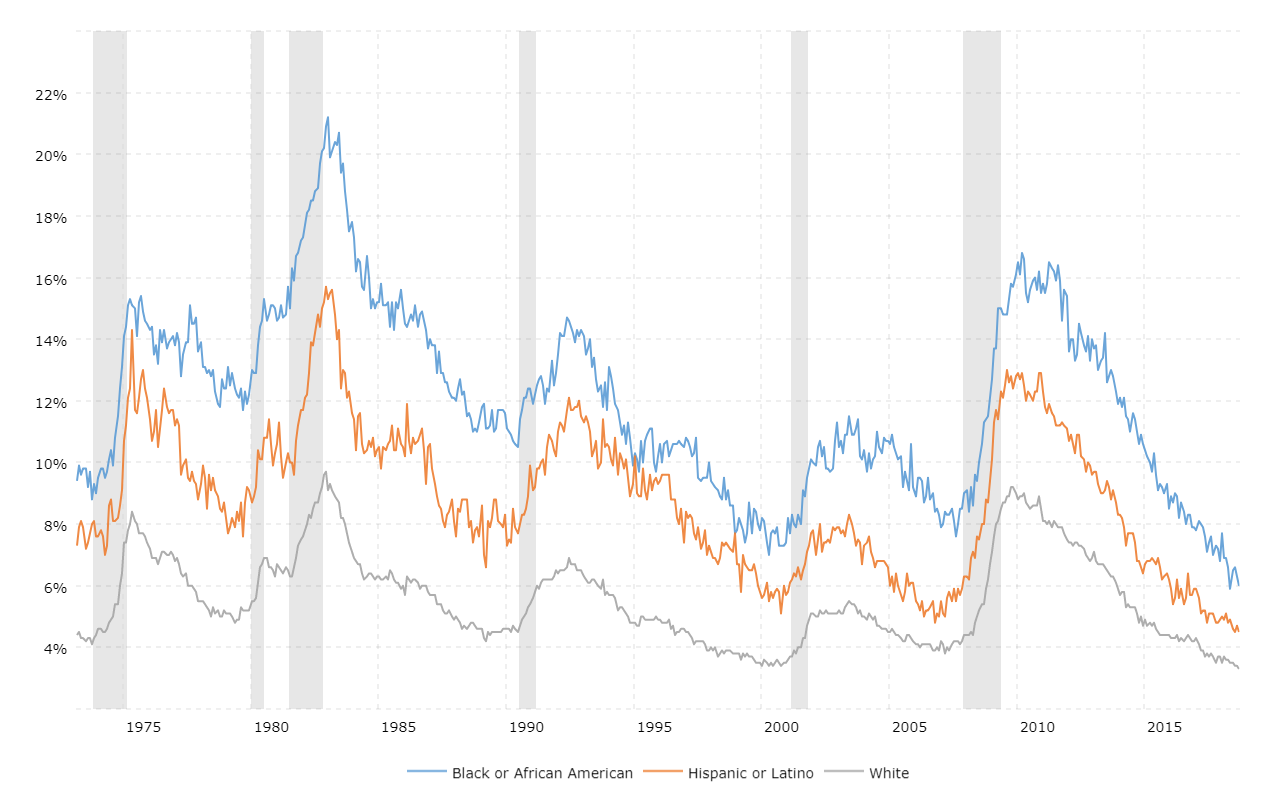By your own admission you only watched a literal minute out of a 15 minute video, so how can you say there is no argument when you didn't even watch to see if there was one? The first dives into it really well and does exactly as I said by going over the
1966 FLSA Amendment Study, which reviewed the impact of minimum wage increases in the 1960s. Bottom line?
The earnings difference between white and black workers fell dramatically in the United States in the late 1960s and early 1970s. This article shows that the expansion of the minimum wage played a critical role in this decline. The 1966 Fair Labor Standards Act extended federal minimum wage coverage to agriculture, restaurants, nursing homes, and other services that were previously uncovered and where nearly a third of black workers were employed. We digitize over 1,000 hourly wage distributions from Bureau of Labor Statistics industry wage reports and use CPS microdata to investigate the effects of this reform on wages, employment, and racial inequality. Using a cross-industry difference-in-differences design, we show that earnings rose sharply for workers in the newly covered industries. The impact was nearly twice as large for black workers as for white workers. Within treated industries, the racial gap adjusted for observables fell from 25 log points prereform to 0 afterward. We can rule out significant disemployment effects for black workers. Using a bunching design, we find no aggregate effect of the reform on employment. The 1967 extension of the minimum wage can explain more than 20% of the reduction in the racial earnings and income gap during the civil rights era. Our findings shed new light on the dynamics of labor market inequality in the United States and suggest that minimum wage policy can play a critical role in reducing racial economic disparities.
That's a nice
claim they make, but the actual body of the article requires an account on their site, and the summary doesn't actually
demonstrate the assertions made here.
When we look at the actual relative unemployment rates though:
This interactive chart compares the historical unemployment rate for the three largest ethnic groups in the United States. Note: Statistics for Asian unemployment are not included here as the Bureau of Labor Statistics did not start including this measure until 2000 and does not provide a...

www.macrotrends.net

www.bls.gov

www.dol.gov
We find that yes, the unemployment rate among blacks is higher, and it's especially higher among young blacks, as Sowell talks about in his various works. Unfortunately, none of the graphed and easily-understandable rate displays I've been able to find track distributed percentages back
before the Great Society and mass expansion of the Welfare state, much less the New Deal or initial implementation of Minimum Wage laws.
However, as the
actual unemployment rate by ethnicity tracks to the claim that minimum wage laws were in part designed to hit blacks the hardest, you're going to need to give us some substance, not just a summary of a study where the actual study is on the members-only part of the site.
Remember kids,
@LordSunhawk says the minimum wage is just a dastardly racist plot to screw over Blacks lol.
Except all of that wealth has accrued at the top, not spread out as you suggest:
Looking the development of U.S. wealth distribution since 1989, the rich have in fact gotten richer, with the top 1 percent expanding their wealth share from 24 percent to 32 percent. The next 9 percent has remained more steady at around 37 percent of wealth held, while the 50-90 percentile has been holding less wealth - 28 percent in 2019, down from 35 percent in 1989.
The development of Corporate Monopolies is indeed bad, but they absolutely did not arise out of increased regulation. Quite the opposite in fact,
with the recent supply chain difficulties being traced to Clinton de-regulating shipping back in the late 1990s for example. If you feel otherwise, what's the evidence?
...So the article talks about how shipping companies manipulating the regulatory environment have allowed them to establish a de-facto oligopoly, which is the 'alliance rather than sole-power' version of a monopoly. Gee, it's almost like (as I said earlier) high levels of regulation encourage mergers and consolidation to result in fewer and fewer companies controlling an industry. Which is exactly what it describes as having happened.
I think he's right in advocating that publicly-traded companies operating in public ports should not be allowed to have private agreements in which prices are secret. Publicly-posted prices and rates that apply to everyone is entirely appropriate.
However, it advocates price-fixing, but completely fails to address the problems with it. Price fixing has caused all
kinds of problems whenever it is implemented.
It also completely fails to address how decades of the Longshoreman's union controlling activity in ports, especially the West coast ports, and steadily increasing onerous and absurd regulation by local governments has heavily contributed to problems.
Starting pay for Longeshoreman is
20 dollars an hour or more, on the west coast, where the primary shipping snarl is, and it's a semi-skilled labor job. By that I mean there is certainly skill to it, and experience makes one better at it, but someone with a high school education and a single day's training can immediately start contributing productively to the work done, which means the natural barrier to entry for the job is low. That's an absurdly high wage, and that kind of wage scale was even
more ridiculous before the general rise in starting wages over the last 5 years.
Longeshoreman Union monopolistic control of labor in ports has been key to keeping levels of automation in major US ports low, to keeping ports from running night shifts (which they especially should have as fewer and fewer ports were handling more and more of the traffic), and generally being a choke-hold on cost-saving and throughput-increasing measures.
He does indirectly mention, but doesn't really focus on, the issues of poor port management that are also a major factor. He references how Peterson has brought attention to some
ridiculous regulations that have crippled port activity, such as the ridiculous 2-high limit on container stacking, as laid out
here.
There are a huge number of factors that have gone into the shipping issue, and while removing anti-trust laws from applying to the shipping industry is part of the problem, it is
only one part, and while price transparency is good, price-
fixing has a host of problems that we do not want to deal with.
Men's wages, on average, declined by 50-60% but Women on average are 20-40% of Men's. This isn't because of them getting paid less then men in the same fields, but because they choose careers that tend to pay less. That also means, however, that women can't explain the decline in wages because they were not/are not competing with women in the same fields. Women becoming secretaries and nurses in large numbers can't explain the drop in pay for manufacturing workers, for example.
Okay? That still doesn't explain why wages have declined because if a company is making "digital goods", they're not competing with a company making computer chips so why should one be effecting the other's wages? They're not in competition over market share because they aren't even in the same market.
Because the labor market
as a whole is one market, even if there's distinct sub-divisions that have very different pressures on them, and semi-rigid boundaries between them. If you double the work force
as a whole, with women entering very nearly all parts of it, there's now directly more competition for jobs in all those parts, and indirectly more competition for the parts that women enter either not at all or nearly so (like sewage work).
The problem that you (and pretty much every 'more government interference' types have, is that you fail to recognize that greedy nasty people who want your
vote to give them power, influence, and wealth, are also a problem. And specifically, they're a more
dangerous problem, because once in office, they will have more power and more force than almost any businessmen will, and historically, in the rare example where businessmen briefly have more power than government officials, the government breaks that power.
I'm not sure how your next section is supposed to relate to the minimum wage argument, so I haven't bothered replying to it.
Real wages have been stagnant for decades and the minimum wage actually peaked in the late 1960s. Today's wages are actually almost half, when adjusted for inflation,
of what workers were making in the 1960s:
Low-wage workers actually saw their purchasing power peak while Johnson was in office. Adjusting for inflation, minimum wage workers earn less today than they did in the late 1960s.
In 1968, workers on the bottom rung of the economic ladder that year earned the equivalent of well over $10 an hour in today's money. But purchasing power of the minimum wage fell sharply in the 1980s, and it still hasn't recovered lost ground. Devonte Yates, who works at a McDonald's in Milwaukee, says he sometimes struggles to pay for groceries and other bills.
I've heard this argument, and it's patently absurd. I don't know what 'purchasing power' metric they're using, but I
do know that over the last sixty years, ownership (or rental properties people live in having) of the following things has drastically increased:
1. Refrigerators.
2. Televisions, then large-screen televisions.
3. Microwaves.
4. Air conditioning.
5. Automobiles.
6. Personal Computers.
7. Cell phones.
8. Washing and drying machines.
Obviously, a couple of these things didn't even
exist sixty years ago, but all of these things have gone from things only for the rich, to for the rich and upper class, to the middle class, to the poor, to everyone except for the destitute.
Hell, I've known
homeless people with smartphones.
Quality of living as measured by number of amenities has drastically increased over the last six decades, as has life expectancy. Where the idea that 'purchasing power parity' has overall declined comes from, I really don't know, because I can speak from demonstrated personal experience that it is possible to live comfortably working
part time on a minimum-wage or just over job in the food service industry. Granted, if you don't live in a low cost-of-living area like I have, you're probably going to need to do full rather than part time, but that's still eminently manageable.
None of this is to say that there
aren't problems with current corporate culture and the like. There are, and they need to be dealt with, but minimum wage laws are
not the solution.





